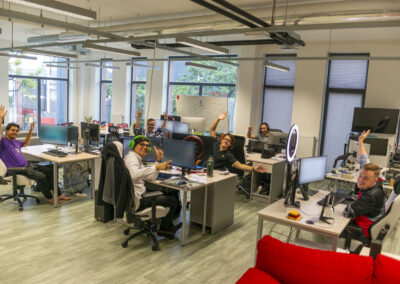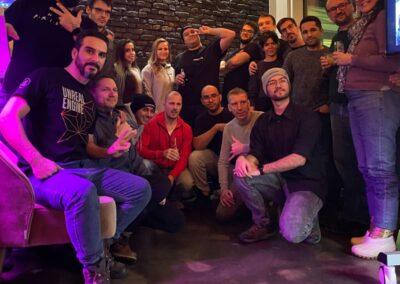Profile
Who are we?
Full Cycle Game Academy is a unique game development education opportunity where you will learn from experienced Unreal Engine specialists. The goal is to provide our students with all the knowledge, experience, and tools to ensure them a spot in the game industry.
The academy will emulate a real-life game development company’s work with the game industry’s widely used tools, experiences, and processes. We will develop your teamwork, organization, and communication skills and offer in-depth training in Unreal Engine. We’ll help you to become a successful Unreal Engine game specialist.
Full Cycle Game Academy has been recognized by Epic Games with the Golden Partner Award, the highest level of recognition, highlighting the academy’s commitment to providing top-tier education in game development through excellence in teaching and adherence to Epic Games’ high standards for interactive media and game creation.
What make us stand out?
Innovativing game development education specializing in Unreal Engine.
Study level
Bachelor’s Studies
Duration of study
1 year
Language
English
Cost per year
3150 € (3600€ for Game programming)
How is this programme structured?
Game Programming
During this Game Programming course, you will:
- Get a hold of the basics of the C++ programming language;
- Learn about programming patterns and their usage both in software and Game Development;
- Learn concepts of Vector Math and their usage in modern games;
- Gain proficiency in Unreal Engine and its development framework;
- Understand Game Networking principles and get the opportunity to put them into practice on your very own multiplayer game;
- Learn how to use the Gameplay Ability System (GAS) from Unreal Engine, an industry-standard framework to develop complex gameplay features;
- Get experience with version control using industry-standard tools to collaborate with other developers;
- Get a hold on the basics of AI for Game Development using Unreal Engine;
- Learn about how to optimize your projects using Unreal Engine’s tools and techniques;
- Put your new skills into practice in a multi-disciplinary project with representatives of all our Game Development disciplines;
- Learn about user interface (UI) design and animation in games;
- Receive feedback from experienced mentors to help you improve your skills.
Throughout the course, alongside guidance from game industry mentors, you will work on two group projects to apply your knowledge and gain practical experience while cooperating with other students, each presented during different Demo Days—one in March and the other in June.
Game Design
During this Game Design course, you will learn about:
- The fundamentals of Unreal Engine and its tools;
- The history of video games;
- Game design concepts and terminology;
- Creating and iterating on game design documents;
- Level design theory and practices;
- Game mechanics and the design process;
- Camera, control, and character design;
- Understanding the core loop and its components;
- Pre-production and pitching in game design;
- Digital prototyping using Unreal Engine;
- Designing challenges, encounters, and combat systems;
- Introduction to programming for game design;
- Visual scripting and advanced input techniques;
- Asset creation for game development;
- User interface (UI) design and game balance;
- Designing artificial intelligence (AI) systems and playtesting;
- Crafting quests, objectives, and storytelling elements;
- The world building and setting creation;
- Advanced blueprint scripting techniques;
- Economy design and strategies for monetization;
- Learn how to develop your portfolio and create a resume and portfolio for a career in game design;
- Receive feedback from experienced mentors to help you improve your skills.
Throughout the course, alongside guidance from game industry mentors, you will work on two group projects to apply your knowledge and gain practical experience while cooperating with other students, each presented during different Demo Days — one in March and the other in June.
3D Art
During this 3D Art course, you will:
- Receive an introduction to 3D theory and the 3D art industry;
- Learn the fundamentals of 3D modeling, including polygonal modeling and subdivision surfaces, retopology techniques, and AAA studio workflows;
- Advance your texturing skills with different styles from realistic to cartoon, using texturing tools and learning baking techniques for creating efficient textures;
- Learn to use 3D tools for 2D projects, such as creating assets for mobile games;
- Develop basic animation and 3D model manipulation skills, including rigging and posing models;
- Learn to use industry-standard software such as Blender, Substance Painter, and Marmoset Toolbag to create high-quality game assets;
- Gain an understanding of the game development pipeline and how to create assets optimized for real-time rendering;
- Learn how to develop your portfolio and create a portfolio of 3D assets that demonstrate your skills in modeling and texturing;
- Receive feedback from experienced mentors to help you improve your skills.
Throughout the course, alongside guidance from game industry mentors, you will work on two group projects to apply your knowledge and gain practical experience while cooperating with other students, each presented during different Demo Days—one in March and the other in June.
VFX (Visual Effects) for Games
During this VFX course, you will:
- Understand and apply the basic skills that allow an artist to create compelling effects for video games.
- Create optimized assets and import them into unreal in an accurate way for performance.
- Understand how Niagara works and how it communicates with other modules inside Unreal.
- Create different kinds of textures in Substance Designer according to each effect’s requirements.
- Create simple meshes in Houdini using basic procedural modeling techniques.
- Create shaders with both realistic and stylized looks.
- Enhance your effects with blueprints.
- Understand and apply the basics of simulations in Houdini and export your work to Unreal.
- Understand the nature of environmental effects; applying a comprehensive skillset from texture to the Niagara setup.
- Undertake character-centric VFX projects, enhancing gameplay with visually stunning abilities
- Work on group projects and individual assignments that encourage the practical application of skills learned in class, culminating in a multi-disciplinary project that showcases your prowess in VFX creation.
Throughout the course, alongside guidance from game industry mentors, you will work on two group projects to apply your knowledge and gain practical experience while cooperating with other students, each presented during different Demo Days – one in March and the other in June.





